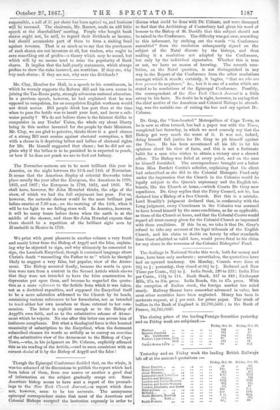We print with great pleasure in another column a very
frank and manly letter from the Bishop of Argyll and the Isles, explain- ing why he objected to sign, and why ultimately he consented to sign, the Lambeth Encyclical, though it contained language about Christ's death "reconciling the Father to us" which he thought likely to suggest a very false, but popular, view of the Atone- ment. The Bishop assented finally, because the words in ques- tion were torn from a context in the Second Article which shows that they were not intended to have the false construction he -deprecates put upon them, and because he regarded the quota- tion as a mere reference to the-Article from which it was taken, not as a doctrinal exposition, and supposed the Encyclical itself to. be a mere salutation addressed to the Church by its heads, -containing various references to her formularies, not as intended to teach either her own members or those external to her com- munion. The letter is explicit enough as to the Bishop of Argyll's own faith, and as to the substitutive scheme of Atone- ment which he rejects. No one after this letter can accuse him of insincere compliance. But what a theological farce is this boasted unanimity of subscription to the Encyclical, when the document subscribed chooses its words so artfully as to convey an assertion of the substitutive view of the Atonement to the Bishop of Cape Town,—who, in his judgment on Dr. Colenso, explicitly affirmed this as his reading of the Article,—and to seem consistent with an earnest denial of it by the Bishop of Argyll and the Isles !


































 Previous page
Previous page